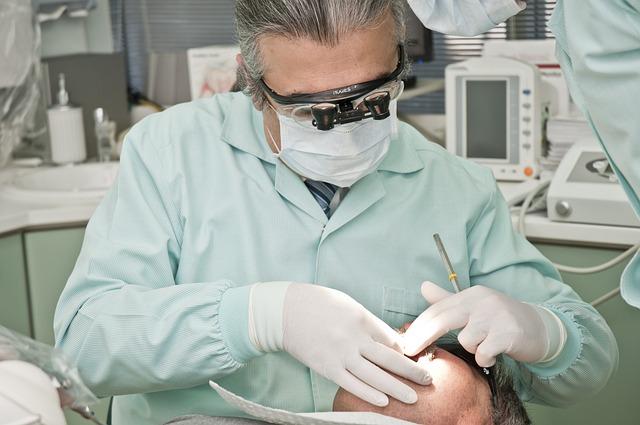What Does Salt Water Do for Tooth Extraction: Understanding Effects
Have you ever wondered why your dentist recommends rinsing your mouth with salt water after a tooth extraction? It may seem like a simple solution, but the effects of salt water go beyond just soothing the discomfort. In this article, we will delve into the fascinating world of dental care and explore the various benefits of using salt water for tooth extraction. By understanding these effects, you will gain a deeper appreciation for this age-old remedy and its invaluable contribution to your oral health. So, let’s dive in and uncover the secrets of what salt water truly does for tooth extraction!
1. The Role of Salt Water in Tooth Extraction: Unraveling the Effects
In the field of dentistry, tooth extraction is a common procedure performed to alleviate pain, remove damaged teeth, or create space for orthodontic treatment. During the healing process, various post-extraction care methods are employed to promote proper recovery and minimize discomfort. One such method that has gained attention is the use of salt water rinses.
Benefits of salt water rinses:
- Promotes healing: Salt water acts as a natural antiseptic, reducing the risk of infection and promoting healing in the extraction site.
- Reduces swelling: The saline solution helps reduce inflammation and swelling, providing relief and enhancing the overall healing process.
- Relieves pain: Gently rinsing the mouth with salt water can alleviate discomfort by soothing the area and reducing irritation.
- Prevents dry socket: Salt water rinses can help prevent the development of dry socket, a painful condition that occurs when the blood clot in the extraction site dislodges or dissolves prematurely.
It is important to note that salt water rinses should be done with caution and as advised by your dentist or oral surgeon. Excessive use or improper technique may have adverse effects on the healing process. Consulting with a dental professional is essential to ensure the best outcomes after tooth extraction.

2. Understanding the Benefits and Impacts of Salt Water on Post-Extraction Healing
Salt water is a natural remedy that can greatly aid in the healing process after tooth extraction. The benefits and impacts of using salt water for post-extraction healing are numerous and significant. Here are some key points to understand:
1. Reduces inflammation: Salt water acts as a natural disinfectant and helps to reduce swelling and inflammation around the extraction site. The salt in the water draws out excess fluid, promoting faster healing and reducing discomfort.
2. Prevents infection: Salt water has antimicrobial properties that can help prevent infection in the extraction site. It effectively kills bacteria and reduces the risk of complications, such as dry socket, which can be painful and delay healing.
3. Promotes healing: Salt water has a soothing effect on the gums and promotes the growth of new tissues. It helps to keep the extraction site clean and free from debris, allowing the body to heal more efficiently.
4. Easy to use: Using salt water for post-extraction healing is simple and cost-effective. Dissolve half a teaspoon of salt in a cup of warm water and gently swish it around in your mouth for about 30 seconds. Repeat this process a few times a day, especially after meals, to maximize the benefits.
Remember, it’s important to follow your dentist’s instructions and not solely rely on salt water for post-extraction healing. While salt water can significantly aid in the healing process, it should not replace professional dental care.
3. Harnessing the Power of Salt Water: How It Promotes Recovery after Tooth Extraction
After undergoing a tooth extraction, it is crucial to follow proper aftercare to ensure a smooth and speedy recovery. One highly effective and natural way to promote healing is by harnessing the power of saltwater rinses. Saltwater has been used for centuries as a natural remedy for oral health, thanks to its numerous benefits. Let’s explore how saltwater can aid in the recovery process:
- Promotes healing: Saltwater rinses create an optimal environment for healing by reducing inflammation and killing harmful bacteria in the mouth. The saline solution helps cleanse the area and prevent infection, allowing the extraction site to heal more rapidly.
- Reduces pain and swelling: The gentle swishing of saltwater in the mouth provides relief by soothing the surrounding tissues. It helps alleviate pain and minimize swelling, making the recovery process more comfortable and manageable.
- Prevents dry socket: Dry socket, a common complication after tooth extraction, occurs when the blood clot protecting the extraction site dislodges or dissolves prematurely. Saltwater rinses can help prevent this condition by promoting proper blood clot formation and stability.
By incorporating saltwater rinses into your post-tooth extraction routine, you can enhance the healing process and ensure a successful recovery. It is important to follow the recommended guidelines provided by your dentist or oral surgeon to achieve the best results. Remember to consult with your healthcare professional for personalized advice before implementing any new oral care regimen.

4. The Science Behind Salt Water’s Healing Properties in Dental Extraction
When it comes to dental extraction, salt water has long been recognized for its remarkable healing properties. The science behind these properties lies in the unique composition of salt water and its effect on the oral tissues.
Here’s a closer look at the fascinating science behind salt water’s healing abilities:
- Osmosis: Salt water creates an osmotic effect, which means that it helps draw out excess fluid from the extraction site. This process reduces swelling and promotes faster healing.
- Antibacterial properties: The high salt concentration in salt water creates an inhospitable environment for bacteria, effectively reducing the risk of infection. It acts as a natural disinfectant, preventing the growth of harmful microorganisms.
- Mineral replenishment: Salt water contains essential minerals such as calcium and magnesium. These minerals play a crucial role in the repair and regeneration of damaged tissues, promoting the healing process.
By rinsing with salt water after a dental extraction, patients can harness the power of these scientific properties to enhance the healing process and minimize discomfort. It is important to note that while salt water can be beneficial, it should always be used as a complementary treatment alongside proper post-extraction care recommended by a dental professional.

5. Unveiling the Wonders of Salt Water: A Natural Solution for Tooth Extraction
When it comes to tooth extraction, there is a natural solution that often goes unnoticed: salt water. This simple yet effective remedy has been used for centuries to alleviate pain, reduce swelling, and promote healing. Here are some of the wonders that salt water can unveil when it comes to tooth extraction:
Pain relief: Salt water works as a natural analgesic, providing temporary relief from the discomfort associated with tooth extraction. Gargling with warm salt water can help numb the area and reduce pain, making the recovery process more bearable.
Reduced swelling: Swelling is a common side effect of tooth extraction. However, salt water can help minimize this inflammation by acting as a natural anti-inflammatory agent. Rinsing the mouth with salt water can help reduce the swelling and promote a faster healing process.
Promotes healing: Salt water has antiseptic properties that can help prevent infection and promote healing after tooth extraction. It creates an environment that is hostile to bacteria, reducing the risk of complications. Regularly rinsing the mouth with salt water can help keep the extraction site clean and aid in the healing process.

6. Exploring the Positive Effects of Salt Water Rinse on Post-Extraction Pain and Swelling
After a tooth extraction, it is common to experience pain and swelling in the affected area. However, recent studies have shown that salt water rinses can have a positive impact on reducing these symptoms and promoting faster healing. Here are some key benefits of incorporating salt water rinses into your post-extraction care routine:
- Reduced inflammation: Salt water rinses help to draw out excess fluid and reduce inflammation around the extraction site. This can alleviate pain and swelling, providing much-needed relief.
- Promotes healing: The saline solution created by mixing salt with warm water creates an environment that is conducive to healing. It helps to cleanse the area, prevent infection, and stimulate blood flow, which aids in the formation of new tissue.
- Natural antiseptic: Salt has natural antiseptic properties that can help fight bacteria and reduce the risk of infection. By incorporating salt water rinses into your post-extraction routine, you can promote a clean and bacteria-free environment, speeding up the healing process.
It is important to note that while salt water rinses can be beneficial, they should not replace proper oral hygiene practices or professional advice. It is always recommended to consult with your dentist or oral surgeon before starting any new post-extraction care routine. They can provide specific instructions tailored to your individual needs and ensure the best outcome for your recovery.
7. Salt Water: A Gentle Companion in the Healing Journey after Tooth Extraction
After a tooth extraction, it is essential to take proper care of the area to promote healing and minimize discomfort. One gentle and effective companion in this healing journey is salt water. Salt water, also known as saline solution, is a simple and cost-effective remedy that can aid in the recovery process.
Here are some benefits of using salt water for post-tooth extraction care:
- Promotes healing: Salt water has natural antiseptic properties that help reduce the risk of infection and promote healing of the extraction site.
- Relieves discomfort: Rinsing with salt water can provide temporary relief from pain, swelling, and inflammation commonly experienced after a tooth extraction.
- Reduces bacteria: Salt water acts as a gentle mouthwash, effectively reducing the amount of bacteria in the mouth and preventing the buildup of plaque.
- Easy to prepare and use: Creating a salt water rinse is quick and easy. Simply dissolve half a teaspoon of salt in a cup of warm water, swish it around in your mouth for about 30 seconds, and then spit it out.
While salt water can be a beneficial part of your healing routine, it is important to follow your dentist’s instructions and consult with them if you have any concerns or questions. Remember to maintain proper oral hygiene, including gentle brushing and avoiding hard or sticky foods, to support the healing process and ensure a successful recovery.
8. The Therapeutic Potential of Salt Water for Accelerated Healing in Dental Extractions
Studies have shown that salt water has remarkable therapeutic potential in accelerating the healing process of dental extractions. The natural properties of salt water create an optimal environment for the body to repair damaged tissues and promote faster healing. Here are some key benefits:
- Antibacterial properties: Salt water acts as a natural disinfectant, killing harmful bacteria that may reside in the extraction site. This reduces the risk of infection and ensures a clean healing process.
- Reduced inflammation: The salt in the water helps to reduce swelling and inflammation around the extraction site, providing relief from pain and discomfort.
- Enhanced blood circulation: Salt water promotes better blood flow to the area, which delivers essential nutrients and oxygen to the healing tissues, aiding in their regeneration.
- Saline solution compatibility: Salt water closely resembles the body’s natural fluids, making it compatible with the oral environment and minimizing any potential adverse reactions.
It is important to note that salt water rinses should only be used as directed by your dentist or oral surgeon. They are typically recommended for a specific duration and frequency to ensure optimal healing. If you are undergoing a dental extraction, consider discussing the therapeutic potential of salt water with your dental professional to determine if it is suitable for your individual case.
9. Salt Water Rinse: A Simple and Effective Technique to Enhance Tooth Extraction Recovery
Salt water rinses are a tried and true method to promote a speedy recovery after tooth extraction. This simple yet effective technique can help alleviate discomfort and reduce the risk of infection. To perform a salt water rinse, simply dissolve half a teaspoon of salt in a cup of warm water. Swish the solution gently in your mouth for about 30 seconds and then spit it out. Repeat this process two to three times a day for the first few days following your tooth extraction.
There are several benefits to incorporating salt water rinses into your recovery routine. Firstly, salt water helps to cleanse the extracted area by reducing inflammation and removing debris. This cleansing action can prevent the formation of bacteria and promote optimal healing. Additionally, the mild salt solution can soothe any soreness or irritation you may experience after the procedure.
It is important to note that while salt water rinses are generally safe and effective, they should not replace proper oral hygiene practices. Be sure to continue brushing your teeth gently, avoiding the extraction site, and using a soft-bristled toothbrush. If you experience excessive bleeding, severe pain, or any other concerning symptoms, it is crucial to contact your dentist for further guidance.
10. Embracing the Healing Benefits of Salt Water in Dental Surgery: An In-Depth Analysis
The use of salt water in dental surgery has been a topic of interest for many years. In this article, we will delve into the in-depth analysis of the healing benefits it provides. Salt water, also known as saline solution, is a natural remedy that has been used for centuries due to its antiseptic and healing properties.
Here are some key points to consider when embracing the healing benefits of salt water in dental surgery:
- Reduced inflammation and swelling: Salt water helps to reduce inflammation and swelling in the oral cavity, making it an effective solution for post-surgical care. It helps to soothe the tissues and promotes faster healing.
- Promotes wound healing: The saline solution creates an environment that is conducive to wound healing. It cleanses the surgical site by removing bacteria and debris, allowing the body to heal naturally.
- Prevents infection: Salt water acts as a natural disinfectant, killing bacteria and preventing infection. It can be used as a rinse or a gentle gargle to maintain oral hygiene and reduce the risk of post-operative infections.
It is important to note that while salt water can provide certain benefits in dental surgery, it should always be used under the guidance of a dental professional. They can provide specific instructions on how to use salt water effectively for your individual case.
Frequently Asked Questions
Q: What does salt water do for tooth extraction?
A: Salt water can be used as a natural remedy to promote healing and reduce discomfort after tooth extraction.
Q: How does salt water promote healing?
A: Salt water has antiseptic properties that help prevent infection and create an optimal environment for the healing process. It can also help reduce inflammation and soothe the gums.
Q: Can salt water alleviate discomfort after tooth extraction?
A: Yes, salt water can provide temporary relief from discomfort by reducing swelling and soothing the area. It is particularly effective in managing mild pain and discomfort.
Q: Is salt water safe to use after tooth extraction?
A: Yes, salt water is generally safe to use after tooth extraction. However, it is important to follow your dentist’s instructions and ensure that the salt water solution is properly prepared.
Q: How should I prepare a salt water solution?
A: To prepare a salt water solution, dissolve half a teaspoon of salt in eight ounces of warm water. Make sure the water is not too hot to avoid causing further irritation.
Q: How often should I rinse my mouth with salt water after tooth extraction?
A: It is recommended to rinse your mouth with salt water after every meal and before bed for the first few days following tooth extraction. This will help keep the extraction site clean and aid in the healing process.
Q: Can I use salt water for any other dental procedures?
A: Salt water rinses can also be beneficial for other dental procedures such as gum surgeries or dental implant placements. However, it is best to consult with your dentist to determine the most appropriate post-operative care for your specific situation.
Q: Are there any alternative options to salt water for promoting healing after tooth extraction?
A: Yes, there are alternative options such as over-the-counter mouthwashes specifically designed for post-operative care. These mouthwashes may contain ingredients like chlorhexidine, which can also aid in promoting healing and reducing the risk of infection.
Q: Can I resume my regular oral hygiene routine after using salt water for tooth extraction?
A: It is important to follow your dentist’s instructions regarding oral hygiene after tooth extraction. While salt water rinses can be beneficial, you should still avoid brushing the extraction site and use gentle care when cleaning the surrounding area.
Q: How long does it take for the extraction site to heal completely?
A: The healing time can vary depending on the complexity of the extraction and individual factors. In most cases, the extraction site will heal within one to two weeks. However, it is essential to attend follow-up appointments with your dentist to monitor the healing process.
Key Takeaways
In conclusion, understanding the effects of salt water on tooth extraction is crucial for proper post-operative care. While salt water can provide temporary relief by reducing swelling and promoting healing, it is important to follow your dentist’s instructions and not solely rely on this remedy. Remember, salt water is not a substitute for prescribed medications or professional dental advice. By using salt water as a supplementary measure, you can enhance your recovery process and minimize discomfort. So, take care of your oral health, stay informed, and trust your dental professional for the best outcome.






